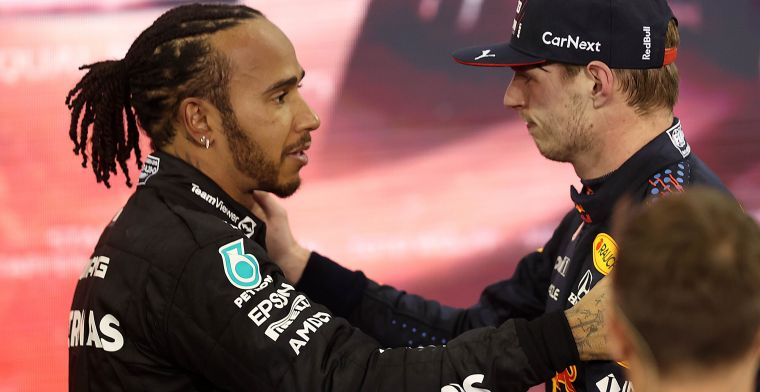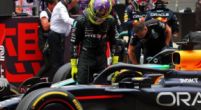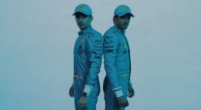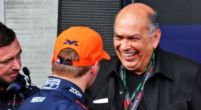Red Bull Contentpool
Column

Race control puts a damper on Verstappen's first world title
Max Verstappen has won his first world title, but the circumstances under which the Dutchman had to win it have left a mark. The Red Bull driver is not to blame, but the Abu Dhabi Grand Prix showed once again that the FIA and the race control have completely derailed this season.
The matchmaker strikes again
After the first round, I wanted to start this column. A sequel to my column last week, in which I described how I didn't understand a thing about this sport anymore. The consistency of the race director was nowhere to be seen after Verstappen was penalised for the same move in Saudi Arabia as in Brazil.
How difficult can you make it as a sport? Where Verstappen had to give a place back to Hamilton at the restart because he had taken advantage outside the track, Hamilton could cut a corner in Abu Dhabi without consequences. Where Verstappen was clearly ahead of him, Hamilton held the lead. For the second weekend in a row, the same action as in the previous race was judged completely differently.
Consistency is key pic.twitter.com/rYfHnee3QK
— Battery Voltas (@BatteryVoltas) December 12, 2021
Now we will never know if this would have had any effect on the race, but that is irrelevant. The fact that a copy of the previous race is judged differently is incomprehensible to me. You can say Verstappen's action was wild, but he made it around the corner. If he had gone off the track he would have been unlucky, but that was not the case at this point.
The safety car
As said, I was actually at a point to write this down during the race, but I wanted to give the race another chance. Maybe justice would still be served. Hamilton, however, turned out to be too fast and so, six laps before the end, this story was almost done. Until Nicholas Latifi's mistake.
It's hard to imagine, but after Timo Glock (in 2008 when Hamilton won his first world title) Latifi will go down in history as the man who unintentionally decided a title race. He brought in the safety car, but once again it was the race committee that cracked under pressure.
Under protests from Red Bull and Mercedes (more on that later), the race committee first decided that lapped cars were not allowed to overtake, only to correct itself later. In the rush to still be able to race only some of the cars were allowed to pass. After this, the decision was made to end the safety car immediately, one lap before it was allowed according to the rules.
Of course for the Dutch and neutral viewer, it was great how the race unfolded, but the race director played too big a role. A race director, as the word says, should lead the race like a referee. At the end of the day, it's about the drivers and shouldn't be about the men behind their desks. That seems to be the case now.
In their drive for entertainment, the race committee, led by Michael Masi, is simply making too many mistakes. The race director has the power to overrule a rule, but not at the expense of a world title. Now rules that are in the book are being flouted to make it a spectacle. In every other race this year the race would have been flagged behind the safety car. If you want a spectacle you have to change the rules and not make choices in the race itself. Then you give teams, in this case Mercedes, a stick to beat you with.
F1 is entertainment
The urge for entertainment has become more visible in Formula 1 in recent years. Actions on the track are punished randomly. When it comes to winning the race, suddenly different rules apply, although the next race might be different. It makes for a lopsided face, and the loser even goes to CAS to get even.
Of course, it is a bit childish for Mercedes to take it this far and in my opinion, they have nothing to gain at all. Hamilton doesn't want to win an eighth title like this either. But imagine if it would have been the other way around? Then the Netherlands would have been too small and Red Bull would have been protesting to the FIA until 2035.
The key question is how could this have been prevented? Simple, the rules need to be changed and clarified. Last week I already talked about the rules regarding overtaking. In my eyes an overtaking action is successful if you make it to the corner. Just like Verstappen in Saudi Arabia, Hamilton should have given the spot back to Max here. They were both pushed off the track by the attacking party, but the attacking party stayed on the track on the inside. If you are an attacker or a defender, if you are pushed outside the track, then you are not entitled to that position. Let's start by enforcing that rule consistently and not switching when things get exciting.
Looking to America
In addition, something needs to happen in the area of the end of the race. Formula 1 should take a leaf out of America's book, because whichever way you look at it, this was an epic end to a race. This is of course much better than a race that ends behind a safety car or during a red flag.
In many American racing classes, there is a rule that the race can be extended. In other words, a race can never end under a yellow flag. There will always be at least one more lap. F1 should also introduce such a rule. That way you don't have sad finishes behind a safety car, but all drivers get a minimum number of laps (even if you only do one) to make it a race with a dignified end.
In their search for entertainment, F1 has been experimenting too much, and that's not possible in a multi-million dollar business like this sport. It is logical that Mercedes is reacting emotionally. They see an eighth title slipping out of Hamilton's hands while rules are being made up. The FIA and the race direction will have to be more straightforward in the future.
Messing about with the team radio
Now for my last point. I'm sick to death of the comments from Mercedes ( Toto Wolff) and Red Bull (Jonathan Wheatley) about Michael Masi on the team radio. I can get incredibly annoyed by football coaches who whine at the fourth man, but this goes a step further.
This connection should be banned. It's okay for the match officials to communicate with the teams, but it should never happen the other way around. Whichever way you look at it, they can exert influence and that should never be the intention. Everyone is under pressure and you shouldn't make it any harder for the race committee than it already is. They make the decision and you have to deal with that. If they can calmly consider their choices and act as consistently as possible, the sport will be much easier to follow for new F1 viewers.
All in all, the FIA and the race management have had too much impact this year. Rules were changed throughout the season (stiffer rear tyres from Pirelli and a new test for the rear wing) and races were run inconsistently. The race in Abu Dhabi is therefore symbolic of the whole season, but it is a shame, because it will always be remembered when thinking back to Verstappen's first title. Hopefully, many more will follow in the future so it doesn't remain a topic of conversation.
This column was created by Tim Kraaij, first published on the Dutch edition of GPblog.com



















































